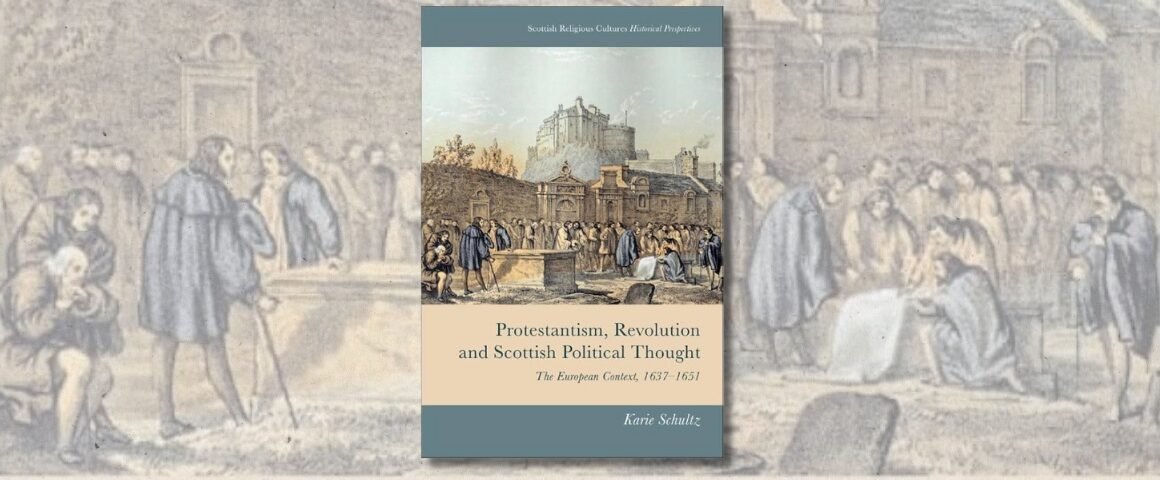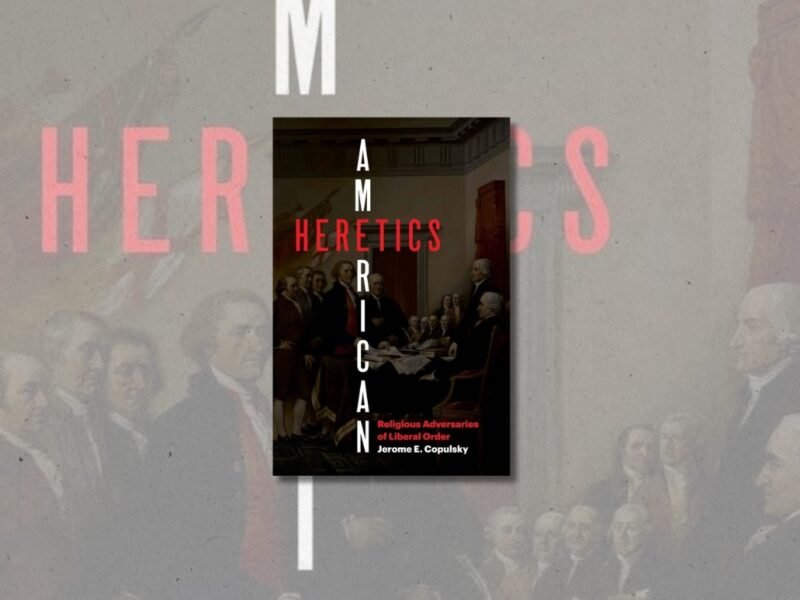Protestantism, Revolution and Scottish Political Thought: The European Context, 1637‒1651. By Karie Schultz. Edinburgh: Edinburgh University Press, 2024. 208 pp. $110 (hardback).
Historians have often assumed that “political concepts traditionally associated with the modern state ‒ such as consent of the governed, parliamentary sovereignty or the election of magistrates” are correlated with “a process of secularisation” in which religious ideas are “marginalised” (2). In the case of the Scottish Revolution, for example, Quentin Skinner has argued that it is “a revolution ‘recognisably modern in the sense of being secular in its premises and populist in its vindication of government by, as well as for, the people’” (4). Other historians have complicated this picture by underscoring the role religion played, yet it remains the case that “there has been no sustained analysis of how the ideas about church and state debated by royalists and Covenanters contributed to (or challenged) the revolutionary nature of this period” (8).
Into the gap steps Karie Schultz with Protestantism, Revolution and Scottish Political Thought, “focusing specifically on the relationship between ecclesiological ideas (those about the abstract nature of the church) and political ones (those about civil government and the commonwealth)” (2). In discussing these ideas, she “takes a distinctly cross-confessional and transnational approach, assessing how royalists and Covenanters combined Lutheran, Reformed and Catholic scholastic ideas from continental Europe with distinctly Scottish approaches to kingship and the kirk” (2). The result is a well-sourced, informative read on the different ecclesiological and political perspectives underlying the Scottish Revolution. Chapter 1 “examines ideas about the godly commonwealth in early modern Protestant thought” (15); Chapter 2 explores the meaning of adiaphora and the magistrate’s role in determining church ceremonies; Chapter 3 focuses on the nature of Scottish royalism; Chapter 4 “shifts the focus to…debates about church government” (16); Chapter 5 takes up Covenanter political thought in the face of “royalist criticisms” (16); and Chapter 6 details the development of Covenanter resistance theory.
There is much to be learned from Schultz’s study, but one of the more important lessons for readers today concerns the nature of a Christian nation or commonwealth as understood within the Protestant tradition. In the modern imagination, a state with any approach to religion other than secular liberalism—in which no religion receives official sanction or support—is often considered “theocratic.” However, as Schultz observes, “For early modern Scots, theocracy would have implied the direct rule of the state by ecclesiastical authorities (such as priests), which was certainly not their aim” (34). A belief in “the civil magistrate’s responsibility to care for religion,” also known as the cura religionis (24)—commonly held by Protestants at the time—is therefore not “theocratic” in this sense. What is more, Schultz clearly illustrates that there have been different ideas about how a Christian commonwealth should operate in its relations between church and state—in other words, although the historic Protestant tradition has held that a Christian nation should support or promote the true faith, there has not been a unitary account of precisely how church and state should relate to one another in this endeavor.
Two relevant issues that were much disputed at the time of the Scottish Revolution are the question of who has proper jurisdiction over church ceremonies and church discipline, and the legitimacy of resistance against the magistrate. Regarding the former, Covenanters held that Christ is the head of the church, obviating any need for a temporal head. They also construed the term adiaphora (“things indifferent”) narrowly, such that “any ceremonies not required in scripture must be omitted from worship lest they lead subjects into idolatry.” Given that the church is Christ’s body on earth, “the General Assembly had the ultimate authority in determining these matters” (63). Moreover, they “maintained that the church possessed its own power to administer and enforce discipline separate from the state” (106). Royalists, on the other hand, held that while Christ is indeed the head of the church, the monarch is its temporal head or supreme governor. They understood adiaphora to be a “larger category” than the Covenanters did, comprising in part “a broad range of liturgical practices” (63). As “things indifferent,” these practices fell under the monarch’s authority, as did the matter of church discipline (106). Concerning resistance, Covenanters believed in “the duty of inferior magistrates to resist an ungodly ruler who harmed the true religion” (137), while royalists insisted that “all Christian subjects had a divinely mandated duty to obey their authorities, even ungodly or tyrannical ones” (70).
These ecclesiological and political disputes are downstream from a more fundamental disagreement over where political authority comes from. Covenanters such as Samuel Rutherford argued for “the natural origins of government” (122). More specifically, they held that “humans served as the original source of political power” (125). Since “civil government required the consent of naturally free human beings” (125), a magistrate only had authority by “the will of the people” (127). Magistrates were ultimately ordained by God, but God did this “indirectly by transferring his power to the people” (126). Thus the relationship between the magistrate and the people was “contractual” (116), meaning that “the people could always recall their original power if the king failed to rule for their good according to the laws of the kingdom” (128). It is on the basis of this belief—that “the people elected their magistrates” (128)—that Covenanters sought to “protect the sovereignty of the church from royal interference,” for if the magistrate was chosen by the people rather than directly by God, then “the king had no authority over the church” (132). In contrast, royalists such as John Maxwell maintained that “ kings held their authority solely from God, not from their subjects” (77). In making this argument, royalists “appealed to the divine right theory of kingship, rejecting the idea of any contractual obligation between king and subjects” (79). They also defended the king’s “supremacy above all laws governing the commonwealth, both civil and ecclesiastical” (80). On this basis, royalists upheld the king’s jurisdiction over church ceremony and discipline. Furthermore, they thereby denied the lawfulness of armed resistance against the magistrate—if the magistrate’s authority came from God alone, then the people had no right to rebel against him. Rather, “God called subjects to obedience alone,” and “God would punish and remove magistrates from positions of authority. He never required Christians to take this action themselves” (84‒85).
This is not the place to adjudicate the competing claims related above—it is profitable enough to emphasize here that intra-Protestant disputes over ecclesiology and duties of obedience are a product of logically prior contests over the origins of political authority.[1] Christians today are often ignorant of these disagreements and their import, so Schultz is to be thanked for illuminating them as they manifested in the context of the Scottish Revolution. Some might argue that the ideas under discussion have no currency in our present moment, but as this book shows, they did once, and they might again someday. For Christians in general—and especially for those who seek to draw on the experience and intellectual heritage of their forebears for the sake of a better future—Schultz’s historical study of ideas is a boon.
Notes
- This is evidenced, for example, by the order in which Stephen Wolfe’s account of the Christian prince and the “right” to revolution unfolds in The Case for Christian Nationalism (Moscow, ID: Canon Press, 2022), 277‒352. “The Origin of Civil Power” comes first, with discussions of “Princely Power and the Church,” “The Prince and Sacred Ceremonies,” and revolution following afterward. ↑







'Book Review – “Protestantism, Revolution and Scottish Political Thought”' has no comments
Be the first to comment this post!